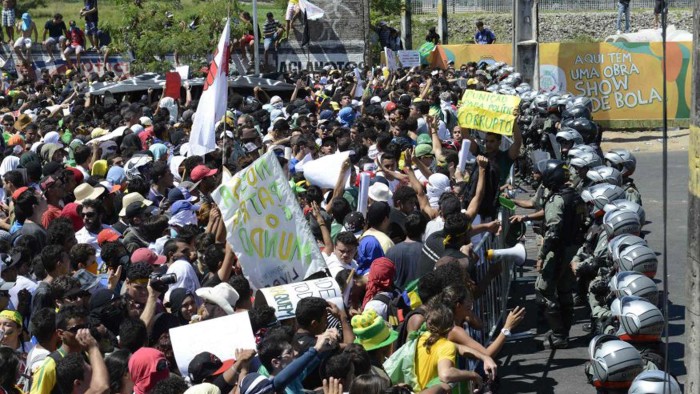Brazilian states in U-turn to defuse protests

Roula Khalaf, Editor of the FT, selects her favourite stories in this weekly newsletter.
São Paulo and Rio de Janeiro’s state governors and mayors agreed on Wednesday to reverse public transport fare increases in an effort to defuse protests that have spread throughout Brazil.
The move came as thousands of people in the northeastern city of Fortaleza protested at a football match in the Confederations Cup, the warm-up tournament for the World Cup next year. Some clashed with police who prevented them from reaching the stadium, while inside dozens of people defied rules set by Fifa, the organiser of the World Cup, and unveiled protest banners in the arena.
“We want schools built to Fifa standards,” said one placard, referring to the high specifications demanded by Fifa for the construction of stadiums in Brazil, in contrast to the notoriously poor public education system.
There were also clashes with police during a protest in Niteroi, Rio de Janeiro. The protests, the biggest in nearly a generation, forced São Paulo governor Geraldo Alckmin and mayor Fernando Haddad to drop a near 7 per cent increase in public transport ticket prices, while in Rio, the governor and mayor also reversed an increase in fares. That issue sparked the protests two weeks ago, but since then they have mushroomed into a national movement fed by outrage at police violence.
“We’ll have to cut back on investments,” Mr Alckmin warned. But he added: “We’re doing this so the city can have peace and can debate the issues with more tranquillity.”
Few believed, however, that the reversal would end the protests, which have widened to include complaints against corruption, poor public services, spending on the World Cup and 2016 Olympics, the cost of living and attempts by the national Congress to weaken prosecutors’ investigative power over politicians.
“The population is participating en masse,” said Mayara Vivian, an activist with the MPL, the main protest group against the bus fare increases.
“We have had various protests in the peripheral areas of the city with participation from workers, mothers. It’s a milestone.”
In mostly peaceful movements, protesters temporarily blocked part of the Anchieta highway, the main conduit for truckers carrying the world’s largest sugar and coffee harvests to the principal port in Santos.
Rallies were also reported in São Sebastião, a smaller port city on the coast of the state of São Paulo, and in the outer suburbs of Rio de Janeiro.
The government deployed special police from the federal National Public Security Force to five states to help with policing at the Confederations Cup.
Protests near games in the football competition held over the weekend in the capital Brasília and at the Maracanã stadium in Rio, the spiritual home of Brazilian football, were put down violently by police.
“I believe there will be no alternative but for governments to back down on the issue of bus tickets,” said Elimar Nascimento, a professor of sociology at the University of Brasília.
He said millions of members of Brazil’s new lower middle class, known as the C class, had entered private and public universities over the past decade and were helping to drive the protests.
Prof Nascimento said this would represent a challenge to President Dilma Rousseff and her ruling Workers’ party, whose claim to legitimacy is the rise of about 40m former poor people into the lower middle class during ïts more than a decade in power.
Until a few weeks ago Ms Rousseff was considered a shoo-in for national elections next year but could face a more serious challenge from the green candidate, Marina Silva, or another popular rival from Brazil’s northeast, Eduardo Campos.
“This is the great worry for Dilma. These protests show an incredible weariness with the political leaders and parties in power and [they] open space for strong alternative candidates,” said Prof Nascimento.
“These protesters actually come from a highly diversified strata of society,” said Narciso Fernandez, a director of the Metro Workers’ union. “A lot come from the [upper] middle class but there are also many from the suburbs, the unions, workers.”
Márcio Baccan, a businessman in the packaging industry, said the movement began among students but that he had joined after becoming outraged by the brutality of the police response. Police were photographed using pepper spray, rubber bullets and tear gas on the protesters and others in São Paulo last week.
Additional reporting by Thalita Carrico in São Paulo
Comments